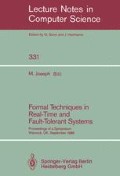Abstract
Remote procedure calls (rpcs) are a distributed programming facility enabling a client program to call a procedure that will be executed by a server computation running on a remote machine. It would be desirable that remote and local procedure calls could be treated uniformly, so as to make distribution transparent to the programmer. But transparency may be impaired if, because of communication or machine failures, computations serving the rpc of a client are allowed to interfere with computations serving later rpcs of that client. This paper gives a formal treatment of interference in rpcs. The formalism used is that of occurrence graphs. The main result obtained is a sufficient condition for rpcs to be interference-free. The practical significance of this condition is highlighted by relating it to interference prevention techniques often adopted in the design of rpc mechanisms.
Preview
Unable to display preview. Download preview PDF.
References
Aho A., Sethi R., Ullmann J., Principles of Compiler Design, Addison-Wesley, 1986.
Best E. and Randell B., “A Formal Model of Atomicity in Asynchronous Systems”, Acta Informatica 16 (1981), 93–124.
Goree J., “Internal Consistency of a Distributed Transaction System”, M. Sc. Thesis, Tech. rep. LCS/TR-286, Massachusetts Institute of Technology, 1983.
Liskov B. and Scheifler R., “Guardians and Actions: Linguistic Support for Robust Distributed Programming”, ACM TOPLAS, July 1983.
Lampson B., “Remote Procedure Calls”, in LNCS 105, 246–265, Springer-Verlag, New York, 1981.
Lamport L., “Time, Clocks, and the Ordering of Events in Distributed Systems”, CACM 21 (7), 558–565, July 1978.
Nelson B., “Remote Procedure Call”, Ph. D. thesis, Tech. rep. CSL-79-3, Xerox Palo Alto Research Center, 1981.
Panzieri F., Shrivastava S.K., “Rajdoot: a Remote Procedure Call Mechanism Supporting Orphan Detection and Killing”, IEEE Transactions on Software Engineering, 14, 1, 30–37, Jan. 1988.
Shrivastava S., On the Treatment of Orphans in a Distributed System, in Proc. of the 3rd Symposium on Reliability in Distributed Software and Database Systems, 155–162, IEEE Computer Society, 1983.
Walker E., “Orphan Detection in the Argus System”, M. Sc. Thesis, Tech. rep. LCS/TR-326, Massachusetts Institute of Technology, 1984.
Author information
Authors and Affiliations
Editor information
Rights and permissions
Copyright information
© 1988 Springer-Verlag Berlin Heidelberg
About this paper
Cite this paper
Pappalardo, G., Shrivastava, S.K. (1988). A formal treatment of interference in remote procedure calls. In: Joseph, M. (eds) Formal Techniques in Real-Time and Fault-Tolerant Systems. FTRTFT 1988. Lecture Notes in Computer Science, vol 331. Springer, Berlin, Heidelberg. https://doi.org/10.1007/3-540-50302-1_15
Download citation
DOI: https://doi.org/10.1007/3-540-50302-1_15
Published:
Publisher Name: Springer, Berlin, Heidelberg
Print ISBN: 978-3-540-50302-6
Online ISBN: 978-3-540-45965-1
eBook Packages: Springer Book Archive

